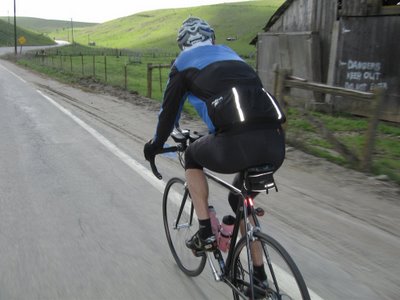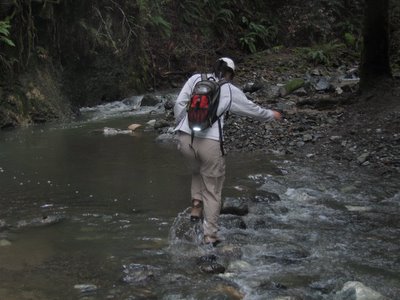It had snowed the day before, so Roberto Peon, Mike Samuel and I decided to go see if we could see some up close on Diablo. Roberto, in particular, had acquired a nice
carbon Fuji and wanted to see how it would do on some substantial climbs. There was some confusion with the meeting point and I had an inexplicable flat front tire in the parking lot at Diablo Vista Park, but with everything ready we got rolling by 10:30.
The ride to the South entrance if
Diablo State Park was enough to get us warmed up, and the climb up Mt. Diablo Scenic Drive soon led us to glorious vistas of the area below: San Ramon and its environs. The day was clear and there was very little mist in the air. To my chagrin I realized that in all the excitement to get going I had left my camera at home! We saw a bit of snow near the peaks, but it didn’t look like it was completely covered in snow. We rode along at a good clip, and as we passed the entrance station we saw a sign that said the road was closed at the Juniper campground.
At the junction, we stopped and rested and ate a little bit before turning right and up towards the summit. Traffic was quite heavy, probably because there were others with the same ideas we had, but wanted to drive up as far as they could. In 2 miles we arrived at the Juniper campground and sure enough, it was closed. The road closed sign was evidently traversable by bicycle but with 2 rangers watching me I did not feel like blatantly ignoring the sign, so we refilled out water-bottles, put on and started rolling down the hill. As I got near the junction road, I saw a steep path leading off from the main road and two men climbing it, one wearing suspenders. I knew it had to be none other than Grant Petersen, so I shouted out his name and rolled up the path.
Grant stopped and I introduced my companions. He was test riding the new 650B tires (I forgot the name: Lumpy Frumpy?), and they definitely looked hefty enough for serious trail riding, with a dimpled tread pattern. We chatted a bit and he asked me why I wasn’t at the handmade bike show in San Jose. I had forgotten all about that show, but in any case would rather be riding bikes than looking at them. I mentioned that we were going to ride Morgan Territory road, and Grant’s companion said, “Good for you!” in a tone of voice that made Roberto and Mike say, “Great. Now we know we’re in for it!” I told Grant about the road closure, and he said that the rangers wouldn’t have fined us even if we had made an illegal run up the mountain. Oh well. I asked Roberto and Mike if they felt like going back up there, and the consensus seemed to be that we had plenty more climbing ahead of us, so we said goodbye to the
Rivendellers and headed down the hill.
Roberto had great fun with his new bike on the descent, and proclaimed it excellent as he rolled and rolled up and down some of the rollers. Soon enough we were in Walnut Creek and made the right turn onto the Contra-Costa County bike trail, which we took over to Treat Blvd and Turtle Creek road. As we approached the town of Clayton, Roberto got a front flat, and discovered a torn in his tire. He took a look at the inner tube of his front wheel and decided that the rubber was so thin that it was just looking for an excuse to puncture, so he put in a new one and threw away the other.
Soon enough, we were in Clayton where we had lunch outside at the Grill. Around us I could see clouds start to gather as the temperature dropped. After a too-heavy-for-me lunch, we started down Marsh Creek road again, which made its way up a hill to get over to the ridge where Morgan Territory road started. I definitely felt the lunch work its way into my stomach, so perhaps Marsh Creek road wasn’t surprisingly steep. Having climbed it on a tandem only, I didn’t think it would be as painful on a single, but apparently it’s not the road, it must always have been the excess food in my stomach.
Traffic on Marsh Creek road was heavy, and it was a relief when the descent started and led us at the bottom to Morgan Territory road where we could relax and breath for a bit. Morgan Territory road starts out as being a few farms and houses and then plunges down to alongside a creek and turned into a road that was narrow (single-lane only), rough, and debris-laden. Nevertheless, the sound of the creek was lovely (I had never seen it so full), and the road as pleasant to ride as ever.
We rolled along a little bit at a gentle pace but soon enough, Roberto felt a bit of vim in started turning up the speed. It took everything I had to stay with him, but as he turned a steep corner I dug down and found nothing, so decided to let him go ahead. After a few corners I saw him again, but he had just passed a truck parked alongside the road and the driver was shooting pictures, so I posed a bit. As I passed I asked him if the camera was digital and he said “yes.” So I turned around and went back to him to provide an e-mail address so he could e-mail me photos. We chatted a bit and he mentioned that Mike was a distance behind me, but I had no doubt he would catch up. I took my leave of Brian Daniels and went after Roberto with little motivation.
It didn’t take long, however, before I spotted him waiting at the entrance to the
Morgan Territory Regional Preserve parking lot. He told me he waited for 4 or 5 minutes and looked very happy. It didn’t take long before Mike showed up. “We’re not far from the top now, and we’ll stop there to put on clothes.” “Is it a bad descent?” “No, it’s straight and long, but the feeling of falling out of the sky always makes me nervous.”
What I was unprepared for, however, was the views. The wind had swept away all clouds while we were climbing, and we could see as far as the windmills of Livermore and the Bay. It looked stunning by the light of the mid-afternoon sun, and I wished I had brought my camera. The descent along the twisty road with lots of blind corners and a single lane wasn’t excessively fast, but had a dreamy, flight-like quality along the smooth road with very little wind. Roberto took off like a rocket as soon as the road started developing rollers, and Mike said to me, “You’ve created a monster.” “Indeed, on his new bike, he climbs fast, descends fast, and rolls fast on the flat!”
We regrouped at the bottom of Morgan Territory road, turned onto Manning and Highland roads, and rolled the remaining miles through beautiful pastoral country side with light coming through partly cloudy skies. All in all, it was a great ride with 63 miles and about 5000’ of climbing.


 It was supposed to be snow at 500' on the night of the 12th, so Lisa & I hiked up to see it! It was pretty warm as we hiked, with rain coming down, so we expected to be disappointed, but indeed there was plenty of snow!
It was supposed to be snow at 500' on the night of the 12th, so Lisa & I hiked up to see it! It was pretty warm as we hiked, with rain coming down, so we expected to be disappointed, but indeed there was plenty of snow! 
 Here I am, a few seconds later. I'd noticed the photographer, so I tried to look more comfortable.
Here I am, a few seconds later. I'd noticed the photographer, so I tried to look more comfortable.


 2 days after it snowed, there's still some residual snow in trees on Skyline Blvd near Castle Rock State Park. It was cold, with crackling sounds filling the air as the clumps of snow disintegrated as it melted, dropping pieces of ice onto the road. The road was moist and gritty with all the dirt stuck to the pieces of snow, but there wasn't any ice.
2 days after it snowed, there's still some residual snow in trees on Skyline Blvd near Castle Rock State Park. It was cold, with crackling sounds filling the air as the clumps of snow disintegrated as it melted, dropping pieces of ice onto the road. The road was moist and gritty with all the dirt stuck to the pieces of snow, but there wasn't any ice. 
 We don't usually see them in Northen California when it's not just pouring on us, so it was indeed a rare day.
We don't usually see them in Northen California when it's not just pouring on us, so it was indeed a rare day. 
 It snowed the last couple of days, so I had to climb Black Mountain to see if I could see some snow.
It snowed the last couple of days, so I had to climb Black Mountain to see if I could see some snow. 
 Route sheets were in short supply at the Morgan Hill LDT today, so Mark Marc handed out pen and paper and the Western Wheelers played "Route Sheet Bingo".
Route sheets were in short supply at the Morgan Hill LDT today, so Mark Marc handed out pen and paper and the Western Wheelers played "Route Sheet Bingo". 
 Winter riding in the Bay Area: lush green hills, beautiful weather, and lovely lovely roads. Photo Credit: Roberto Peon
Winter riding in the Bay Area: lush green hills, beautiful weather, and lovely lovely roads. Photo Credit: Roberto Peon 
 I've learnt not to expect too much from a point and shoot, even the 8 megapixel Canons. But sometimes, I get pleasantly surprised.
I've learnt not to expect too much from a point and shoot, even the 8 megapixel Canons. But sometimes, I get pleasantly surprised. 
 I'd never done the Saratoga loop hike before --- I've always just mountain biked it, but in winter part of the trails are closed to mountain bikes, so I got Shyam & Yajie to hike it with me. The river is wide (but mosquito free because it was quite cold), and the hike back up on Charcoal Road is just as hard as I remember biking it. (This was the easier of the two stream crossings --- at the other stream crossing, I was too busy taking off my shoes, tossing them across the stream, and then wading in the cold river to take any pictures)
I'd never done the Saratoga loop hike before --- I've always just mountain biked it, but in winter part of the trails are closed to mountain bikes, so I got Shyam & Yajie to hike it with me. The river is wide (but mosquito free because it was quite cold), and the hike back up on Charcoal Road is just as hard as I remember biking it. (This was the easier of the two stream crossings --- at the other stream crossing, I was too busy taking off my shoes, tossing them across the stream, and then wading in the cold river to take any pictures) 
 I was very tempted to title this post: "Republicans are Evil, Part V". Lara Hansen, Senior Scientist of Climate Change at the World Wildlife Fund came to give a talk about the impact of global warming on animal habitats, and mentioned in passing that the American Pika is one of the most affected by global warming.
I was very tempted to title this post: "Republicans are Evil, Part V". Lara Hansen, Senior Scientist of Climate Change at the World Wildlife Fund came to give a talk about the impact of global warming on animal habitats, and mentioned in passing that the American Pika is one of the most affected by global warming.